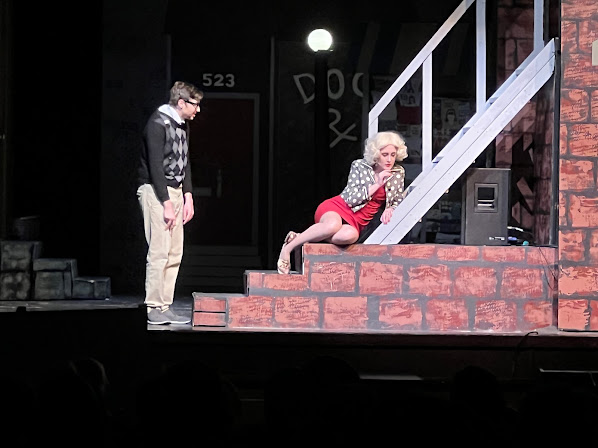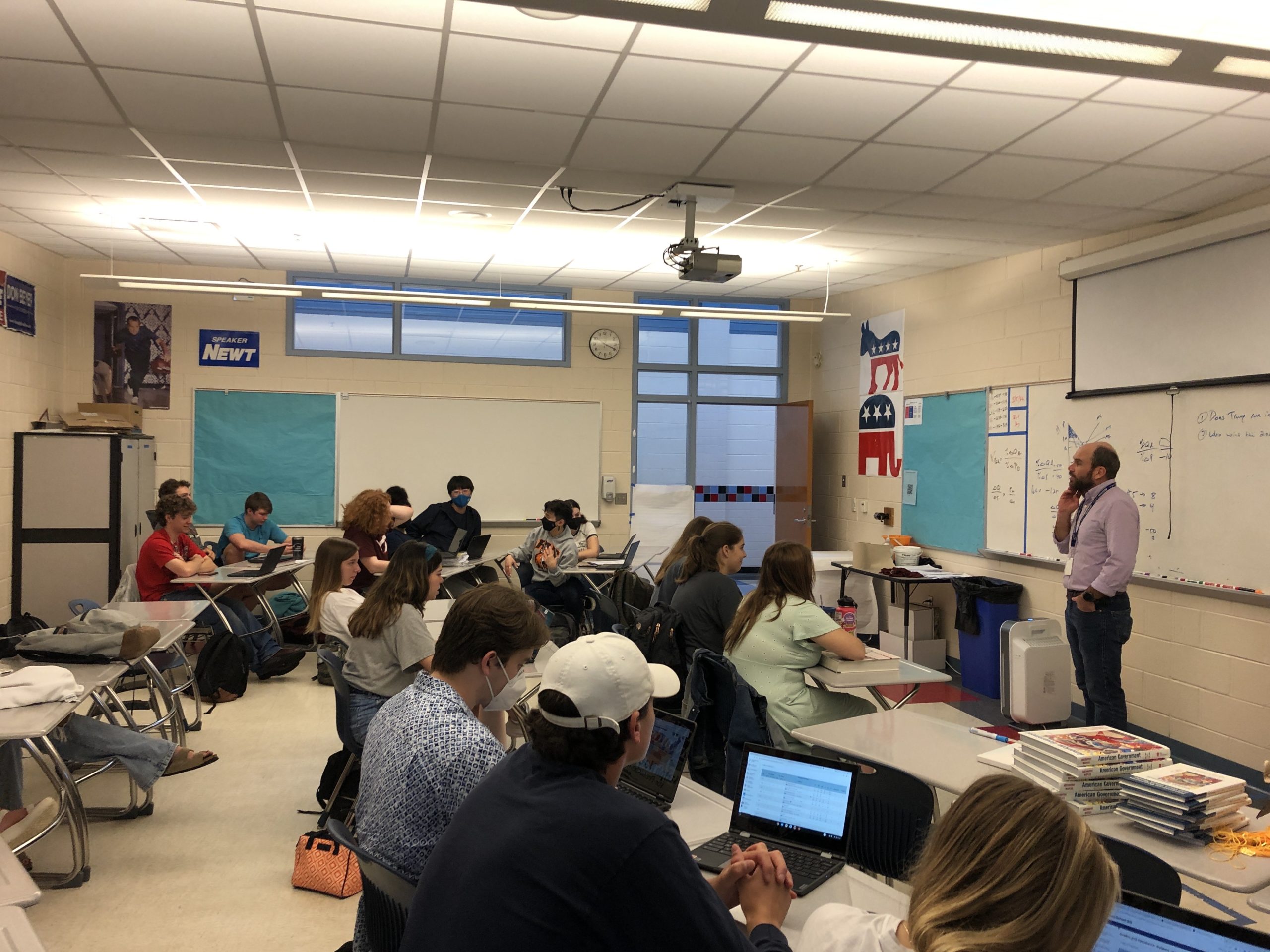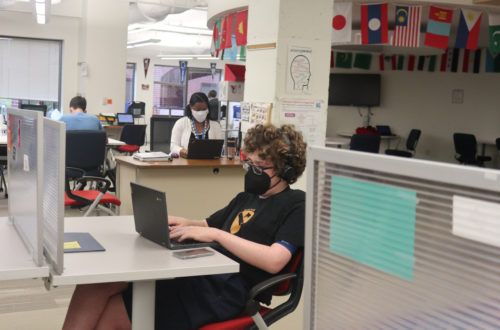Reflecting on the ACPS theatre department: past, present, and future.
Yahney-Marie Sangaré
Editor
The curtains are drawn and the house lights are flickering. The crowd’s whispers descend into silence. The music rises, and the scene is unveiled; in the auditoriums of George Washington Middle School, Francis C. Hammond, and Alexandria City High School, a new world takes precedence.
“Theatre, like any artform, gives the creator and the audience a profound way of looking deeply into the nature of what it means to be human,” said drama teacher Robert McDonough. As the department rebuilds and regrows after two years of the pandemic, we take a look into the theatre departments of George Washington, Hammond, and ACHS and the students that participate in them.
George Washington Middle School: Mr. Robert McDonough
Robert McDonough is a graduate of Harvard’s Institute for Advanced Theatre Training. After an eclectic entertainment career, including being an actor, director, and theatre founder in Chicago at the Greasy Joan & Company, a professor at the University of Memphis, and working for Who Wants to be a Millionaire, he came back to Alexandria, where he was informed that there was an open position as a drama teacher for George Washington Middle School (GWMS). He started teaching at GWMS in Autumn 2007 and “hasn’t looked back since.”
At George Washington, drama classes are open to all grade levels. There is “a lot of reading” from “plays that are simple and charming like Ms. Nelson is Missing to many different texts from Shakespeare’s canon.” Sixth graders start off with fundamentals, history, and writing, and by the time they are in eighth grade, they will have not only had the chance to participate in the extracurricular shows, which annually vary between plays and musicals, but potentially the opportunity to participate in the Text Alive! Shakespeare Theatre Program.
“Our program is rooted in creating theatre, not just studying it,” said McDonough. “Like any artform, it is our philosophy that to understand, to learn, to appreciate it, we have to create it.”
In keeping with the tradition of creation, students are not restricted to acting. Not only do students learn costume and light design, but in school-wide productions, they are often thrust into tech roles; sixth through eighth-graders take on the task of lightboard operation, stage management, and running crew.
“The interesting thing is the challenges of putting on a production are the same whether you’re working with members of the union on a professional level or middle schoolers who can’t remember their last name,” said McDonough. “Are there frustrations, obstacles, conflict? Of course. There’s institutional difficulties to overcome, but the cool thing about being in theatre is you’re always adapting. You never get what you want, but you work with it.”
Of the various productions that have taken place in George Washington’s historic auditorium, McDonough recalls Hairspray as having a “really meaningful” effect on the school’s community. He also mentions the first production they put on at the school, Myth Adventures, which then received a winter readaptation in 2017. Other recent productions include 2018’s High School Musical, 2019’s Great Expectations, where middle school students took on Charles Dickens’s iconic story of love and loss, and 2020’s Frozen Junior, which was interrupted the week before its impending performance by the COVID-19 pandemic.
“[COVID-19] hasn’t changed the basic structure of the program, but when we were in the virtual world it created production challenges and certainly made the experience of teaching and learning sometimes strange and sometimes wonderful,” explained McDonough. “It is an understatement to state that we are eager and hungry to return to our usual production schedule next school year.”
Students who matriculate through GWMS’s theatre program, especially those involved extracurricularly, often go on to high school theatre. Throughout fifteen years in the department, McDonough has done a variety of productions worked to have students understand such stories as Romeo and Juliet. However, McDonough’s most memorable production took place only two years into teaching, when he wrote and produced The Walking Boys with his friend Salva Dut, a member of the Dinka, part of the Nilotic Ethnic Group in South Sudan.
“It was a story about his 800-mile journey across the Sudanese wilderness, fleeing his war torn country. Teaching the kids [this show] at GWMS was a remarkable learning experience for all of us which culminated in the first production of the play which has been read and produced in middle schools throughout the country,” said McDonough. “I remember I saw first production outside of our school of [The Walking Boys] in Jackson, Mississippi soon afterwards, and I was amazed by the manner in which other young people from another part of the country can take the same story and develop such a compelling performance. It taught me that middle school kids have an enormous capacity for empathy and love.”
Francis C. Hammond Middle School
Aaron Jackson is a graduate of Speech Communications and Theater Arts at Dillard University in New Orleans, Louisiana. His background in theatre “was strictly on the acting technique side.” He studied theatre at New York University and Second City in Chicago, Illinois. Unexpectedly, he was not involved in productions in high school but “took a drama class and loved it.” After a mentor in university compelled him to pursue theatre, when he was originally on an education track, he, too, “never looked back.”
Originally, Jackson worked with elementary and high school students. He began teaching at Francis C. Hammond five years ago, where the first production was The Wiz, which “went so well that we had to add a show.” Of course, there were challenges transitioning from professional and youth theatre to middle-grade; for the show, it was sound, lights, and crowd adaptation, and for Jackson, it concerned teaching.
“It was different at first working with the students at Hammond because the way the classes are designed the students don’t really get to pick a field of choice,” said Jackson. “I had a class split with students who did not want to be in theatre and some who love it. I had to start teaching in the middle to accommodate both groups. The after-school program helped for students who were above average in the field.”
Jackson cited support from the administration as being crucial to the department’s success. “My principal is so important to the overall success of our program,” he said. “She just loves our kids so much. Anything she can do to make our lives easier, she makes it happen.”
Hammond’s theatre classes focus on “acting technique, improvisation, and script writing.” He provides a foundation for students to build on if they continue their theatrical experiences.
Alexandria City High School: Ms. Leslie Jones and Mrs. Hope Bachman
Hope Bachman attended Francis C. Hammond Middle School and T.C. Williams High School, where she learned under the drama teacher, Karen Master. She became heavily involved in theatre after “swapping” band for theatre in her freshman year due to her enjoyment of an eighth-grade showcase, although she recalls that her passion for theatre began “when [she] was too young to really name it.” She began teaching at T.C. Williams in the autumn of 2003.
“I had a moment where theatrical design felt like a good fit, but in education, you get to do it all,” she said on why she chose to teach drama, “You get to do some acting, plenty of directing, design, you get to help with the build. You may get to write things. There is no part of theatre that I don’t occasionally get to touch. There’s no one part that I love more than another, so this is, in many ways, the perfect fit.”
Leslie Jones grew up in a family of diverse interests. With her father being a “sports freak” and her mother always taking her and her siblings to the movies, she was both an avid listener of rock-and-roll, Motown soul, and country, a flutist in the marching and concert band, a cheerleader, a runner, and, of course, a thespian. “Growing up, I was always in both worlds,” she said. Jones was introduced to theatre through school and church.
“I knew I was going to major in theatre when I went to college at Penn State for undergrad, and then Brooklyn College for graduate school. I didn’t want to be a teacher, so 31 years later, people look at me like I’m crazy,” Jones admitted. “I went back to school after joining the program Teach For America. I’m in the second corps, starting in the second core in 1991, moving to Los Angeles to do my teaching gig there. I lived in LA for 8 years and then moved to Virginia, where I’m finishing my 18th year producing at ACHS.”
Bachman and Jones work as a partnership in both teaching the drama classes and directing and producing plays at ACHS. “Jones and I started working as a partnership in 2004-2005, which has been such a blessing. We challenge each other in good ways; our strengths complement each other. We each bring a perspective that helps each other and the department continue to grow,” said Bachman.
The partnership is necessary; the department rarely has a minute to spare. In a typical year, there is a fall play, a Winter One Acts Festival, a Spring Musical, and a Writer’s Festival workshop. With so many productions, students tackle a large variety of forms of drama.
“I would like to think that what we show the community is that we can strike a balance between just having fun and using this art form to educate. Jones has tackled the heavy stuff, because that’s her thing…Being able to tackle those issues through theatre is very rewarding but does need to be held in balance with things that are just about joy or silliness or that kind of stuff. I think we can provide that balance; show both sides of what theatre can be,” said Bachman.
“I really thank our school system for being receptive and open, even if everyone doesn’t agree–because there are people out there who don’t agree with some of the plays I direct–at least they don’t try to stop it. They make sure all of the students in our building get the chance to experience all different types of theatre,” said Jones, who has directed such plays as The Laramie Project and Tell Me That You Love Me, Junie Moon.
Jones and Bachman have put on many plays over the years, but a few stand out. Bachman, while insisting on the difficulty to pick, described the 2012 production of Crazy For You. “Part of the setting is this sort of Western ghost town, where they’re trying to save the town by having an attraction there. One of the things the cowboys and residents try is to have a staged barfight, so trying to choreograph 30 actors into this melee onstage was a lot of fun. It was chaos, but everybody had such a good time doing it. It was just such a cheerful kind of thing. To the best of my recollection, no one ever got actually hurt.”
“My favorite moments are always when something happens in a performance that the audience really responds to. That audience/performance synergy is clear and you can tell the audience is responding to the actors, and the actors are feeling it. When that happens, it’s magic. It’s why I prefer live theatre to other forms of dramatic performance. You can get goosebumps from something that happens in a movie, but it’s not reciprocal,” said Bachman.
In addition to directing a variety of plays and musicals at ACHS, Bachman wrote The Brick Joke, a play directed and performed by students in 2020 for the Winter One Acts Festival. “That whole experience in writing a play that wasn’t specifically written for student actors but having students respond to the story and choosing to take on challenging roles as adults dealing with adult marriages, relationship issues and be awarded for it was really, really cool. Those actors showed such maturity and were willing to talk about the themes in what I wrote, and it kind of proved to me that I had something there as a writer, that there was enough in the script that even high schoolers who didn’t necessarily have the lived experience could still identify with some of the emotions and things that the characters were going through.”
Jones brought up several examples, including The Wiz, Chicago, Dreamgirls, and Romeo and Juliet. She talked about Noises Off and Twilight Los Angeles 1992, which she called the “aura” of “unbelievable”, and The Laramie Project. “If we centered theatre on one culture, it would be slapping the face of the students in our school. If we’re not trying to involve as many people as possible, what are we doing here?”
She also mentioned the recent production of Facing Our Truth. “I cannot express my gratitude towards the cast, crew, leadership, the parents, faculty; everyone who was involved with Facing Our Truth: the superintendent, central office, everyone. They were absolutely beautiful.”
Naeem Scott, playing crazed dentist Orin Scravello, is surrounded by Jayden Benitez, Sarah McMahon, Sydney Payne, and Maria McLemore, playing ‘urchins’, during Little Shop of Horrors. Photo credit: Yahney-Marie Sangaré.
Returning from the pandemic, ACHS’s theatre department is in a state of constant rebuilding. Bachman described how the time lost robbed the opportunity of seeing “continual, uninterrupted growth”, an experience echoed throughout all classrooms and departments but especially grave in theatre. “You have to, as an actor, trust your directors with big emotions, sometimes those big emotions touch on actual things going on in their lives and there’s a lot of trust built there. The pandemic disrupted that process of building a relationship and trust,” explained Bachman.
This sentiment is echoed by Jones: “I try to be an actor’s type of director,” she said. “I try to empathize and sympathize…be the type of director that students can come to when they’re having issues. Especially learning lines-learning lines is the worst thing for me! As a teacher, you know students who are having a hard time versus students who just didn’t put in the work.”
However, returning from two tumultuous years has brought about a change that may otherwise have not occurred. “I think everyone has appreciation for what they missed and has come in with so much enthusiasm this year in part because none of us are taking the experience for granted in a way that we might have two years ago,” said Bachman.
“In the 23 years that I’ve been here, I’ve seen the highs and lows of the student body, which is probably what happened with students around the country. This last six years or so, the kids in the school have been relentless. They’ve started talking to students outside of their comfort zone to get them to see the plight of the injustices going on within our school. Students who were not aware are becoming aware, saying, ‘Hey, I want to be an ally, an agitator, help you to get things to change for the better for all of us.’,” said Jones. “I’m sitting here looking at the student body doing this and thinking, ‘If the student body can do this, why can’t the faculty?’ That’s when my social justice awareness peaked to its highest.”
Jones helps coordinate the collaboration between Black Student Union’s Black History Month celebration and the theatre department. This year, she said “everything came together.”
Of course, after over a decade of teaching, there are notable stories. “We’ve got several graduates who are making a go of it professionally in theatre or music. They occasionally come back, usually with positives and thank yous for what they learned here. Very few students are going to be able to leave high school theatre and go straight to professional acting without some additional training and life experience in the meantime, but every student who has gone that direction seems to feel like we’ve given them a really good foundation. Maybe we didn’t cover everything we needed, but we gave them a good solid basis to build on,” said Bachman.
The ACHS theatre department has bright horizons. “I want to make sure that students are getting opportunities that they desire. I think we’ve got a good balance. I think with some changes to some of our outside support structures, more might be possible, but there needs to be some structural changes before that is possible,” said Bachman.
“We want to partner with the theatre community more. Ms. Bachman and I are looking forward to partnering more with our colleagues on the middle school level, as well as the Alexandria community and theatre communities beyond Alexandria because we both have contacts. We’re looking forward to that next chapter in our theatre department,” said Jones.
The Students:
Theatre brings in all types of people. Whether students have been stage managing since sixth grade or decided to take drama on a whim their junior year, there’s a place for them in the department. Everyone has a different reason for participating, but it all comes back to one thing: community.
“Theatre has given me the space to be unauthentically myself, I can act as silly and weird as I like because at the end of the day people are so non judgemental and accepting. The community I’ve gained through theatre is something I will always appreciate,” said senior Sylvia Rahim. Rahim joined the theatre department through Winter One Acts as a sophomore, also taking Introduction to Theatre, and has since been in both Facing Our Truth and Little Shop of Horrors, alongside co-directing the one act Governing Alice.
“The core of theatre is to bring about entertainment. When I’m on stage and I play a powerful force, musical or not, I put myself in the character’s shoes and I become them. For me, it’s about escapism,” said Junior Naeem Scott. Scott is a student in the Advanced Theatre class and was involved with Winter One Acts and Little Shop of Horrors.
“Theatre has opened me to a world of camaraderie. I have met so many amazing people who have helped me learn to be a better person and have taught me a multitude of extremely random things,” said junior Jeffrey Brenchley. Brenchley did theatre at GWMS (King Midas, King Minos, Abel Magwtich). He also does theatre at the Little Theatre of Alexandria for almost five years, with four of those years focusing on improvisation. He directed two one acts plays in 2021 and 2022 and currently is playing the titular character in the Advanced Drama Class’s production of King Lear.
“I was a pretty shy kid before I started taking acting classes at ACHS and I never imagined myself standing in front of an auditorium full of people. Theatre got me out of my comfort zone socially,” said junior Jeneya Kamara, who has been taking drama since freshman year and began to participate in ACHS productions in 2021, being involved in Facing Our Truth, Winter One Acts, and Little Shop of Horrors.
For those who choose to work offstage, theatre still provides respite and opportunity. Alongside the drama, ACHS offers stagecraft classes that work on everything from design to construction. The plays and musicals at ACHS are also unique in that they are partially student-directed, with construction and stage management also conducted by the students under the guidance of Jones or Bachman.
“Our theatre department is great at attempting to include people new to theatre. No matter their sex, gender, or race they’re welcomed,” said sophomore Tanween Syed, who worked on set-building and stage crew for Little Shop of Horrors, the Winter One Acts Festival, and Facing Our Truth.
“Anyone can give theatre a try and if you have even the slightest desire to, go for it. You won’t regret it,” said sophomore Maikol Centeno.
“I’m a part of tech crew. I am a lighting designer, and light board operator. My job consists of not only designing the look of the show, but the setup for it as well, with light maps and positioning on catwalks and rows of lights,” said sophomore Jesse Jones. Jones, coming from doing acting, adapted into the technical role, “I really was on a path to do nothing tangible with my life, but technical theatre just picked me up and made me want to actually be something. I got my GPA up, started actually considering college, all over some musical theatre stuff. It’s kind of embarrassing that the thing that actually made me think about my life past sixteen was musicals but whatever works I guess!”
Senior Stuart Conrad, who recently played the lead role of Seymour Krelborn in Little Shop of Horrors, has been in 22 productions throughout his eighteen years. At ACHS, alongside Seymour, he has been involved since ninth grade, including Beauty and the Beast (Beast’s Guard) and (for 2022 Winter One Acts) The Baloney, the Pickle, the Zombies, and Other Things I Hide from My Mother (The Baloney). “Theatre is one of the many activities I’m involved in here at ACHS…but I’d say it’s certainly one of my favorites. During the quarantine school year of 2020-2021, I was unable to do any theatre…or really any activity of any kind outside of a select virtual few. In that time, a realized how much I adored theatre,” he said, “It’s a creative outlet, a place where you can play any character you want and maybe learn something about yourself in the process. While I wouldn’t exactly completely describe myself as a “Theatre Kid” I would say the art form is very near and dear to my heart and definitely something I plan to pursue in the future.” Conrad also stressed the importance of integrating the arts with STEM, “They call it STEAM for a reason: We need the arts to differentiate us from the robots.”
Senior Preston Goodin has been involved in theatre since going to middle school at GWMS, where he played Tybalt in Romeo and Juliet and Coach Bolton in High School Musical. He directed the fall play, Facing Our Truth, and has also participated on tech in other productions. “Some of the greatest days of my life have been opening and closing nights. Seeing the culmination of months of work from dozens of people is such a raw experience that you can’t really find anywhere else. I owe a lot of myself to theatre and the people I’ve met through it. So if you have any semblance of an urge to join, I highly recommend you do. Don’t let other people’s opinions or your own self-consciousness stop you. I promise everyone in that department wants to meet new people and will gladly help you get to the spot you want to be at.”
Transparency: Sangaré has been involved in the theatre department since sixth grade. She was involved in the following mentioned shows: Myth Adventures (2017), Great Expectations (2019), Frozen Jr. (2020), Facing Our Truth (2021), Winter One Acts (2022), and Little Shop of Horrors (2022). All quotes used here are from interviews conducted by Theogony.






